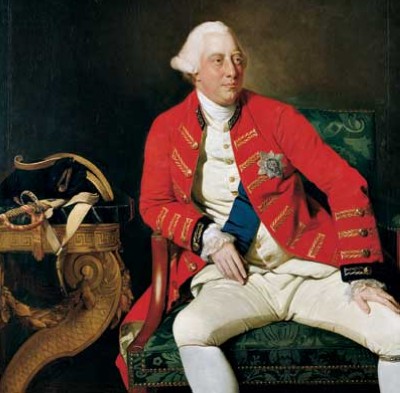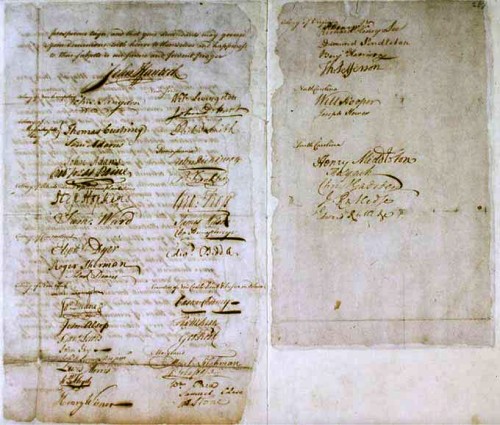King George III could not have foreseen that ignoring the Olive Branch Petition would cost him all his land in the America, so recently secured from French invasion during the Seven Years War.
“To the King’s Most Excellent Majesty, and Most Gracious Sovereign,
“We your Majesty’s faithful subjects of the colonies of New-Hampshire, Massachusetts-Bay, Rhode Island and Providence plantations, Connecticut, New-York, New-Jersey, Pennsylvania, the counties of New Castle, Kent, and Sussex on Delaware, Maryland, Virginia, North Carolina and South Carolina, in behalf of ourselves and the inhabitants of these colonies, who have deputed us to represent them in general Congress, entreat your Majesty’s gracious attention to this our humble petition …”
Thus begins the petition sent by the Second Continental Congress to King George III. The letter was sent in high hopes that the King would favor them, understand their pleas and problems, and step in to address them.

King George III in 1771, painted by Johann Zoffany
The country was getting ready for war. With some of the colonists being loyal to the King, the congress thought it best to petition the king in hope that there could still be peace.
King George, however, did not even read the Olive Branch Petition when it was delivered.
When the colonies of America discovered that the King did not even look at the document, it enraged them. This was one of the major causes of the American Revolution.
The Writing of the Olive Branch Petition
The Olive Branch Petition, also known as The Second Petition to the King (because a previous petition had been sent by the First Continental Congress) and The Humble Petition, was written twice before it was given to King George.
The first draft was written by Benjamin Franklin, Thomas Jefferson, John Rutledge, John Jay, and William Livingston. When it was first presented to the committee of congress on June 24, 1775, it was not approved. Congress sent the petition back to its writers, which had mainly been written by Benjamin Franklin himself.
Thomas Jefferson rewrote the document in simpler words, then John Dickson, realizing that the first draft was written too harshly and would only anger the king, adjusted Thomas Jefferson’s draft to perfection.
Excerpt from Final Draft of
the Olive Branch Petition
“Attached to your Majesty’s person, family, and Government, with all devotion that principle and affection can inspire; connected with Great Britain by the strongest ties that can unite societies, and deploring every event that tends in any degree to weaken them, we solemnly assure your Majesty, that we not only most ardently desire the former harmony between her and these Colonies may be restored, but that a concord may be established between them upon so firm a basis as to perpetuate its blessings, uninterrupted by any future dissensions, to succeeding generations in both countries, and to transmit your Majesty’s name to posterity.”
Later, Jefferson, Franklin, and others would write the Declaration of Independence.

original signatures from the Olive Branch Petition
The Olive Branch Petition as a Cause of the Revolutionary War
The letter clearly states many times that the colonists were loyal to the King and guaranteed that they were not seeking independence. They simply wanted the king to address their grievances.
They sent it to England by the hand of Richard Penn, son of William Penn, founder of Pennsylvania. However, the king refused to receive it. Two days later, he wrote publicly that the colonies were going into full scale rebellion and called for Parliament to come to his aid in settling the American rebellion.
What did not help is that John Adams, opposed to the Olive Branch Petition, had written a letter to General James Warren speakiness of readiness for independence and mentioning the stockpiling of arms. It was intercepted by the British and published. This only solidified the king’s worries that the colonies were in rebellion.
On November 7th, the Olive Branch Petition was presented to the House of Commons, where they tried to consider it as a petition for reconciliation. The motion was defeated.
On December 4th, the Continental Congress forged a second document attempting to persuade the king to hear their grievances. They published the letter and sent it to agents in Great Britain. This, too, was rejected by King George without being read.
The King’s response to the Olive Branch Petition struck a hard blow against the colonists, especially those who wanted to stay in peace with Britain. Now that the reality was known, most colonists felt reconciliation would be impossible.
The next spring, Thomas Paine wrote Common Sense, which expressed the colonists’ right to fight against the King’s tyrannical ways, throwing fuel on an already raging fire. The Declaration of Independence would follow hard on its heels that summer.


